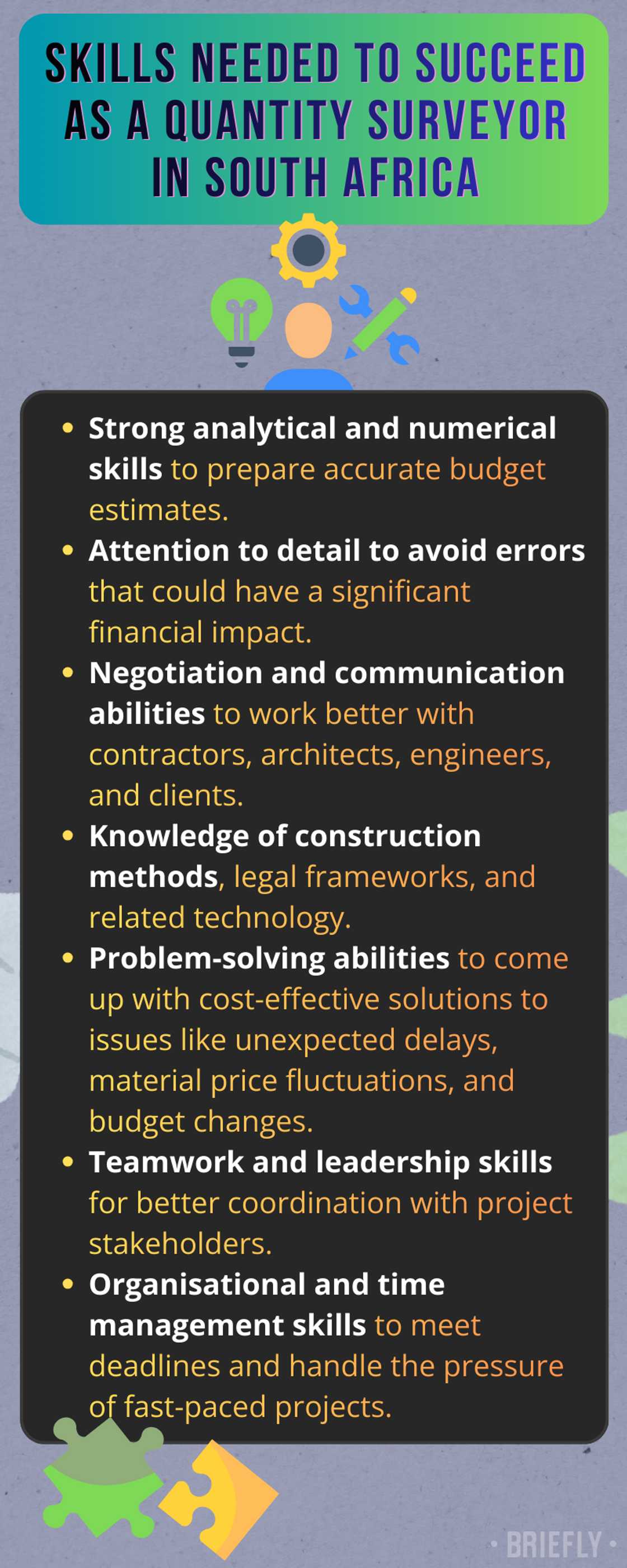How to become a quantity surveyor in SA: duties, skills, and career outlook
Quantity surveyors in South Africa work in construction to minimise costs and enhance value for money, which keeps construction projects from spiralling into financial chaos. To join the profession, you need relevant academic qualifications and be registered with SACQSP.

Source: Getty Images
TABLE OF CONTENTS
Key takeaways
- Quantity surveyors are financial and contractual experts in construction who ensure building projects are completed on time, within budget, and to the required standards.
- The South African Council for the Quantity Surveying Profession (SACQSP) regulates the QS profession, and one must register with the body to practice.
- The demand for quantity surveyors in South Africa is on the rise as the country's construction and building industry grows.
What does a quantity surveyor do?
A quantity surveyor is a construction professional who manages all costs related to a building or civil engineering project. Their job description entails these key responsibilities and duties:
- Cost estimation and planning: Prepare initial cost estimates for projects, including materials costs, labour, equipment costs, and related expenses.
- Tendering and procurement: Prepare tendering documents and evaluate the received bids to secure competitive pricing. They also negotiate contracts and work schedules with contractors and subcontractors.
- Financial management: Monitor costs and ensure the project remains within the approved budget throughout the construction phase. They track variations and their impact on the set budget to avoid overspending.
- Valuation and payments: Value the work done by contractors and subcontractors before approving payment.
- Contract management: Quantity surveyors draft and manage contracts to ensure compliance and resolve disputes.

Source: Getty Images
Where do quantity surveyors work?
Quantity surveyors work in various settings across the property and construction industries. Their work has a mix of office-based duties and on-site visits. Common workplaces include:
- Quantity surveying consultancies
- Construction companies
- Real estate and property development firms
- Government departments and local authorities where they work on public infrastructures like roads, hospitals, and schools
- NGOs and international development agencies
- Academic institutions as instructors or researchers

Source: Getty Images
How to become a quantity surveyor in South Africa
There is a set of quantity surveyor requirements that one must meet before they are allowed to offer their services on a professional level. It entails achieving a recognised academic qualification, gaining practical experience, and passing SACQSP exams before ending with professional registration.
1. Quantity surveyor educational qualifications
The first step on your journey to becoming a quantity surveyor is to have the right educational qualifications. One can pursue a Bachelor of Science degree, a Diploma, an Advanced Diploma in Quantity Surveying or a related field like Construction Economics, Building, or Built Environment.
Quantity surveyor courses are offered at several top South African universities with accreditation from SACQSP, including:
- University of Cape Town
- University of the Witwatersrand
- University of Pretoria
- Nelson Mandela University
- University of the Free State
- Cape Peninsula University of Technology
- Durban University of Technology
- Tshwane University of Technology
- University of Johannesburg
- Walter Sisulu University

Source: Getty Images
2. Complete work-integrated learning
After earning an accredited degree or diploma, aspiring quantity surveyors are required to obtain practical skills. This includes a minimum of 33 months of in-service training under a registered professional quantity surveyor. Most programmes at SA universities have work placements or internships in the final year of study.
3. Professional registration
Candidate quantity surveyors may be required to complete and pass a set of Professional Skills Modules (PSMs) or council exams from the South African Council for the Quantity Surveying Profession (SACQSP). This step proves their professional competence before they can apply to register with SACQSP and start practising professionally. Once you are registered, you can add the suffix PrQS to your name.

Source: Getty Images
Skills needed to succeed as a quantity surveyor in South Africa
To be able to handle their duties properly, a good quantity surveyor should have a mix of technical, financial, and interpersonal skills, including:
- Strong analytical and numerical skills to prepare accurate budget estimates.
- Attention to detail to avoid errors that could have a significant financial impact.
- Negotiation and communication abilities to work better with contractors, architects, engineers, and clients.
- Knowledge of construction methods, legal frameworks, and related technology.
- Problem-solving abilities to come up with cost-effective solutions to issues like unexpected delays, material price fluctuations, and budget changes.
- Teamwork and leadership skills for better coordination with project stakeholders.
- Organisational and time management skills to meet deadlines and handle the pressure of fast-paced projects.
How much is a quantity surveyor paid in South Africa?
The average quantity surveyor's salary in South Africa is estimated to be R24,900 per month, according to Payscale. The lowest base salary is around R10,000 per month, and the highest-earning individuals in the profession make over R48,000 per month.
Are quantity surveyors in demand in South Africa?
Professional quantity surveyors are in demand in South Africa and feature on the Department of Home Affairs critical skills list gazetted in October 2023. The country has several ongoing large-scale infrastructure projects and a growing focus on urban development and housing.

Source: Getty Images
Conclusion
Becoming a quantity surveyor can lead to a rewarding professional future due to the continuous demand for skilled professionals. By pursuing this career, you will also be helping build the future of South Africa.

Source: Original
DISCLAIMER: This article is not sponsored by any third party. It is intended for general informational purposes only and does not address individual circumstances. It is not a substitute for professional advice or help and should not be relied on to make decisions of any kind. Any action you take upon the information presented in this article is strictly at your own risk and responsibility!
READ MORE: Top 27 highest-paying engineering jobs in South Africa today
Briefly.co.za highlighted the highest-paid engineering jobs in South Africa. Specialised and senior roles often pay higher salaries and bonuses.
Top-earning engineering fields include petroleum engineering, software engineering, and aerospace engineering. Senior-level positions in these fields could exceed R1 million per year.
Source: Briefly News






